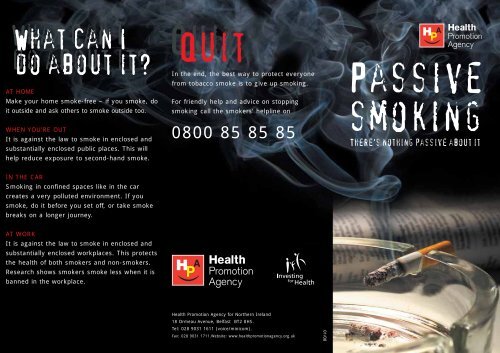Passive Smoking - Health Promotion Agency
Passive Smoking - Health Promotion Agency
Passive Smoking - Health Promotion Agency
Create successful ePaper yourself
Turn your PDF publications into a flip-book with our unique Google optimized e-Paper software.
AT HOME<br />
Make your home smoke-free – if you smoke, do<br />
it outside and ask others to smoke outside too.<br />
WHEN YOU’RE OUT<br />
It is against the law to smoke in enclosed and<br />
substantially enclosed public places. This will<br />
help reduce exposure to second-hand smoke.<br />
In the end, the best way to protect everyone<br />
from tobacco smoke is to give up smoking.<br />
For friendly help and advice on stopping<br />
smoking call the smokers' helpline on<br />
0800 85 85 85<br />
IN THE CAR<br />
<strong>Smoking</strong> in confined spaces like in the car<br />
creates a very polluted environment. If you<br />
smoke, do it before you set off, or take smoke<br />
breaks on a longer journey.<br />
AT WORK<br />
It is against the law to smoke in enclosed and<br />
substantially enclosed workplaces. This protects<br />
the health of both smokers and non-smokers.<br />
Research shows smokers smoke less when it is<br />
banned in the workplace.<br />
<strong>Health</strong> <strong>Promotion</strong> <strong>Agency</strong> for Northern Ireland<br />
18 Ormeau Avenue, Belfast BT2 8HS.<br />
Tel: 028 9031 1611 (voice/minicom).<br />
Fax: 028 9031 1711.Website: www.healthpromotionagency.org.uk<br />
01/08
Even if you don’t smoke yourself, breathing in<br />
other people’s cigarette smoke can damage<br />
your health. Breathing in someone else’s<br />
smoke is called passive smoking (or<br />
sometimes involuntary or second-hand<br />
smoking).<br />
The smoke that’s given off by the burning tip<br />
of a cigarette is actually much more toxic than<br />
the smoke inhaled (through the filter) by the<br />
smoker. The air in a room where people are<br />
smoking contains around 4,000 chemicals, and<br />
at least 60 of them are known or suspected to<br />
cause cancer.<br />
Breathing in second-hand cigarette smoke can<br />
have short-term effects, like irritating your<br />
eyes, or giving you a sore throat or a cough.<br />
But the long-term effects of passive smoking<br />
are much more dangerous.<br />
Regular passive smoking can<br />
increase your risk of:<br />
• lung cancer by 20-30%<br />
• heart disease by at least 25%<br />
• asthma by 40-60%<br />
• stroke by 80%<br />
Ventilation isn't the answer to passive<br />
smoking. Ventilation systems that replace<br />
smoke with fresh air would have to be set to<br />
tornado strength rates of air flow to<br />
significantly reduce the health risks. Systems<br />
that filter the air aren't effective either,<br />
because they only trap the particles in<br />
cigarette smoke, not the cancer-causing<br />
chemicals and toxic gases.<br />
Children are even more at risk because of their<br />
smaller lungs and the fact that their bodies are<br />
still developing. <strong>Passive</strong> smoking can affect<br />
babies before they’re even born – the toxins in<br />
the smoke get into the mother’s bloodstream<br />
and reach the baby that way.<br />
Exposure to smoke before or after<br />
birth makes a baby:<br />
• twice as likely to suffer from colic<br />
• three times more at risk from<br />
cot death<br />
• more than three times as likely to get<br />
meningitis<br />
Older children exposed to cigarette smoke<br />
may suffer from delayed mental development,<br />
asthma and other respiratory infections, such<br />
as bronchitis, pneumonia or bronchiolitis, and<br />
middle ear infections (glue ear).

















